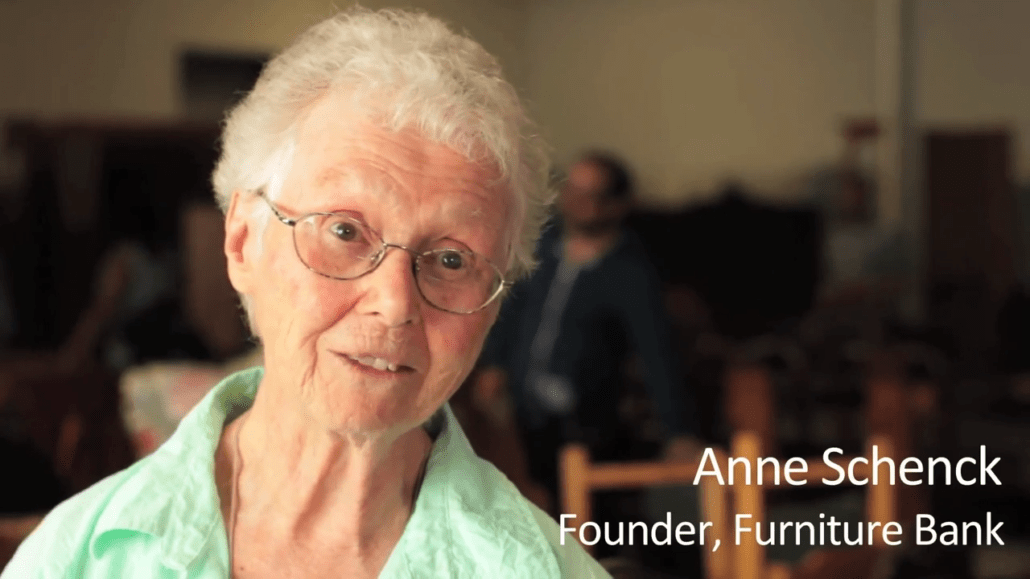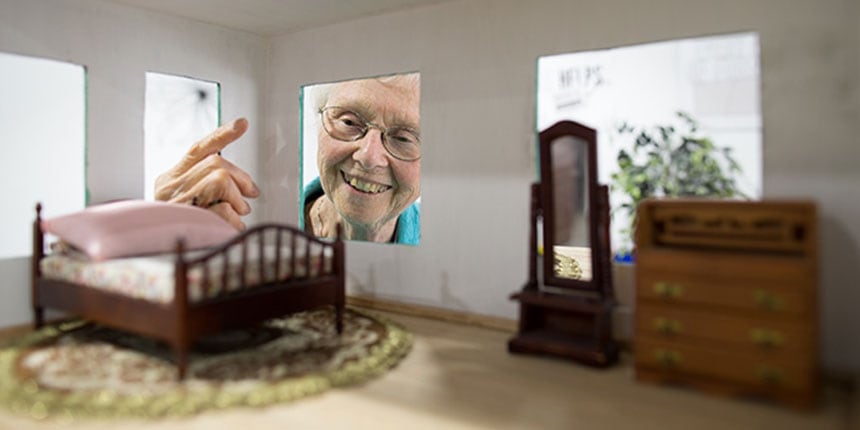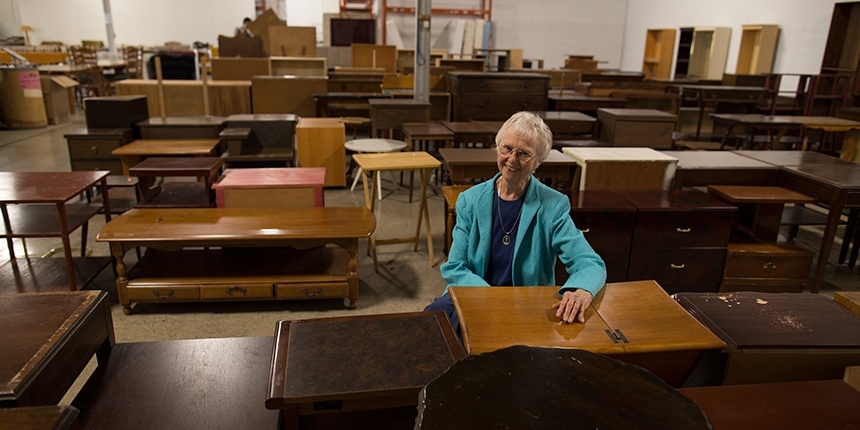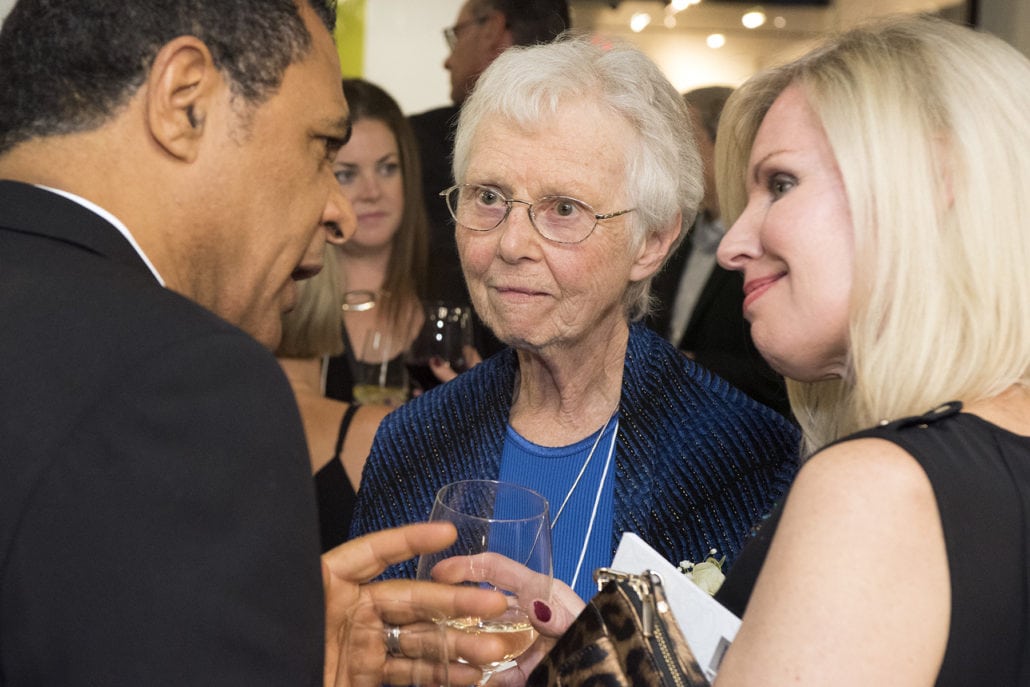
“They’re creating a home, and when we give them a choice in the furniture that goes in that home, we’re giving them their dignity and a gift of mercy.”
Sister Anne Schenck
Sisters of St. Joseph
Founder of Furniture Bank

“They’re creating a home, and when we give them a choice in the furniture that goes in that home, we’re giving them their dignity and a gift of mercy.”
Sister Anne Schenck
Sisters of St. Joseph
Founder of Furniture Bank


Furniture Bank has evolved to inspire much more than a simple transfer of furniture from those who have, to those who don’t. The Furniture Bank movement is one of dignity and empowerment – of individuals transitioning out of homelessness, of women and children escaping abusive situations, and of refugees and newcomers settling into their new homes in Canada. Sister Anne was once asked, “why does the idea of Furniture Bank resonate with almost everyone who encounters it?” She answered, “It speaks to the heart and it’s something that everybody everywhere can understand.
While running a refugee centre in Scarborough, a pivotal moment in her life led to the inception of the Furniture Bank we know and love today.
Newcomers were moving into apartments with absolutely nothing to call their own. After receiving word from a social agency that there was a newcomer desperate for help, she immediately lent a hand.
Sister Anne recalls the moment,
“When I entered the house, I saw four kids–all under the age of five–sitting around a little 12″ TV. I did a basic inventory of what she had in the kitchen: two plates, two forks, two tiny pots. I knew I couldn’t cook myself dinner with what she had, let alone cook dinner for these four children. It was that moment that I said to myself that this shouldn’t be happening in the city of Toronto. I was too busy running the refugee centre to do anything about it at that time but in that role, I was already collecting furniture and some household items. That’s where it began.”
As Sister Anne put it, we don’t know the poor. There are an estimated number of people in Toronto alone living without furniture in their home, but how would you know that? These people aren’t boasting the fact, they’re hiding it. Thanks to Sister Anne, they have somewhere to go to ask for help.
The driving principles behind Sister Anne’s vision are to spread hope, to support those struggling to escape poverty, and provide them with a secure home in which they can take pride. She founded a culture of respect for everyone who dealt with the organization and focused on providing a dignified experience for the families and individuals they supported.
Sister Anne was once asked, “Why does the idea of Furniture Bank resonate with almost everyone who encounters it?” She answered, “It speaks to the heart and it’s something that everybody everywhere can understand.”
From its humble beginnings, Furniture Bank has since given over 110,500 Canadians and their families a new start with the gift of a furnished home by way of 10,000 tonnes of furniture and housewares diverted from landfills.
It’s not just furniture clients that Sister Anne intended to help. At the very start, she and Sister Gwen Smith needed a lot of help lugging couches around Toronto. Sister Gwen, who was helping recovering alcoholics, recruited these men to move furniture. “She got three or four of the guys in recovery to come,” said Sister Anne, “and they found purpose in life.”
From that point on Sister Anne went out of her way to try and employ people who otherwise would have trouble finding jobs. That spirit has developed into the Leg-Up Program. Now there is a woodworking shop, positions in the warehouse, the call centre, and any area that Furniture Bank can offer skills training. Furniture Bank creates roles for people struggling to find meaningful employment including refugees, formerly homeless or incarcerated, or different abled.
Sushma, a newcomer to Canada just a few short years ago, credits Furniture Bank’s LegUp program for making her the person she is today. Despite having a accounting degree from her home university, achieving Canadian accreditation was an enormous challenge for Sushma. Furniture Bank supported Sushma in accomplishing her dream of achieving a professional accounting designation.
“I owe Furniture Bank my life,” Sushma makes painstakingly clear. “The person I am today, meaning both the personal and professional parts of me, have been cultivated and cared for by Furniture Bank over the past several years. The culture here is unlike any other. It’s a culture of caring for everyone involved. Because of Sister Anne, our founder, not only have I benefited every day, every week and every month since, thousands of other individuals have benefited in some way by her mission.”
Sister Anne’s solution has created a ripple effect of positive local impact in the areas of environment, employment, and social well-being.
Read stories from Furniture Bank team members about Sister Anne’s impact on them.
As Sister Anne said, “Our support is rooted in the fact that people want to see other people get helped.”
Furniture Bank continuously strives to actively share our experiences and best practices with other furniture banks nationwide to help them help more, move towards a Zero Waste Economy, and provide a best-in-class employment program that results in sustainable livelihoods in Toronto and beyond.
The national level of need is overwhelming.
In Canada, 1 in 5 children live in conditions of poverty and that ratio climbs to 1 in 2 for First Nations children. Furniture is an essential component of the basic need for shelter and rest.
Please help us in honoring Sister Anne’s legacy and make a donation in memory of Sister Anne. Your gift will provide local solutions on a national scale.

Because everyone deserves a furnished home.
Canada Helps Securities
Donate stocks, bonds, and mutual funds through Canada Helps.
Add a Bequest in Your Will
Leave a lasting legacy by naming Furniture Bank as a beneficiary.
Corporate Donations
Connect corporate goals to direct social impact with donation of in-kind items.
FURNITURE BANK | Registered Charity | #87253 1843 RR0001
Copyright © FURNITURE BANK 2023. All Rights Reserved.
Our Hours
Mon-Fri: 8:30am – 4pm
Walk-ins Monday to Friday, 9am – 3pm
Appointments Monday to Friday, 9am – 2pm